-
Genealogy & Names
-
Tourist Information
-
Culture & Reference
|
June 2019 
Rural Scene in Ireland image from Free Photos Of Ireland |

|
|

| Popular Articles from Recent Newsletters: |


|
Ireland has quite a poor reputation for delivering large-scale infrastructure projects. Just about every major project is subject to poor oversight and massive cost over-runs. In recent years these include the Dublin Port Tunnel, the debacle over the switchover to electronic voting machines, the costs of the new National Children and Maternity hospitals and most recently the outrage over the cost of completing a national Broadband network. 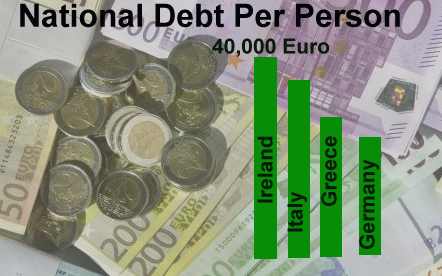
All of the these projects have involved huge amounts of money wasted, subsequent public outrage that is occasionally defused by the announcement of an investigative Government inquiry or by having some official explain the situation before the Government 'Public Accounts Committee'. Inevitably no-one is ever really held accountable and the officials and government of the day who authorized the wastage of public money fade from public consciousness while collecting their ridiculously large pensions. Thus it has always been and it seems always will be. However there is one debacle that defies belief if only because of its sheer scale. Yet when the Irish public is presented with the stark numbers the collective response is to shrug the collective shoulders. The National debt of Ireland currently stands at over 200 Billion Euro with the cost of servicing that debt having increased by a factor of three since the financial crash over a decade ago. Ireland has paid over 60 Billion euro in interest since the crash, with an estimated 45 Billion of that amount being linked directly to the the loans received in the wake of the crisis of 2009. But let us be clear where this money is going to. It is being transferred directly from the wages of Irish workers to French and German banks and investors who, facilitated by the EU/ECB/IMF troika, blackmailed the Irish people into accepting loans so that their bond-holders could be repaid their gambling debts. To get an idea of the scale of this we should consider the most recent examples of institutional government wastage that have so exercised the talking heads on Irish radio and television news-shows, and Irish journalists be they online or in print.
The three examples above cost just over 5 Billion euro which is less than one year's interest (INTEREST!) that is paid out of the public coffers annually just to service the Irish national debt (and not even to repay it). The Nazis believed that the bigger the lie the more that people will believe it. In Ireland we believe that the bigger the amount of money wasted, the less it seems to matter. This is part of human nature of course. As consumers we will complain bitterly about the pennies extra that it might cost to fill our cars with petrol while doing nothing about the thousands we lose on our mortgages, even when cheaper alternatives abound. There are several definitions of the term 'banana republic'. In economic terms it can describe an economic model in a country that is operated as a private commercial enterprise for the benefit and profit of a ruling class. Ireland may not have crackpot military dictators or a grumbling impoverished proletariat toiling daily in scorched fields and factories. Yet what we have is a more subtle form of exploitation. A more insidious one. One where the debts accrued by the current generation are being stored up to be repaid by their children and grand-children. |

|
The Irish Government has unveiled its Climate Action Plan that has 183 individual proposals to tackle climate change problems. 
The recent local and European elections in Ireland saw a significant number of Green Party MEPs and Councillors elected in what some commentators labeled a 'Green Wave'. The immediate response by the Fine Gael Government led by Taoiseach Leo Varadkar was to hastily put together a vast range of measures, many of which will have profound consequences for the Irish citizenry if fully implemented. The use of single-use plastics is to be curbed or outright banned. These may include single-use plates, cups, balloons and straws while grocery packaging that cannot be recycled will be taxed. The volume of plastic used in the wrapping of groceries is currently of particular concern. Up to half a million Irish homes are to be retrofitted with insulation and will have their gas or oil boilers replaced with alternative heating devices. The new installation of oil and gas boilers will be completely banned by 2025. Local Councils will be given new powers to restrict designated parts of towns to vehicles that are 'zero-emission'. This effectively means that cars can be banned completely from certain areas and is part of the plan to shift car usage away from petrol and diesel cars to electric vehicles and bicycles. The Government wants to have a million electric vehicles on Irish roads by the year 2030 with the sale of petrol cars being banned from that year. A new Climate Action Delivery Board will be established to ensure the plans are implemented. The plans have been criticized by the Green Party who point out that there are no actual costings for the ambitious plans, especially since the Irish State currently takes in a huge amount of revenue from Irish motorists in the form of excise duty on oil and vehicle registration tax. Incentivizing motorists to switch to electric cars while simultaneously reducing Government tax income from motorists is a double whammy of expense, the consequences of which could be severe for the Irish economy. |

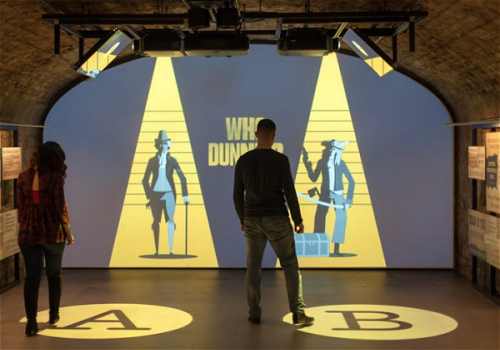 Topping a list of European tourist attractions that includes The Louvre in Paris, The Coliseum In Rome and Sagrada Familia in Barcelona takes some doing, but that is exactly what a relatively new site in Dublin has achieved.
Topping a list of European tourist attractions that includes The Louvre in Paris, The Coliseum In Rome and Sagrada Familia in Barcelona takes some doing, but that is exactly what a relatively new site in Dublin has achieved.
The Epic Emigration museum is unlike most museums you will ever visit. Most of the exhibits are interactive in some way with Irish history being brought to life via the recorded voices and transcripts of the people who actually lived it. The museum was voted as Europe's top tourist destination in 2019 at the annual 'World Travel Awards', the awards in their 26th year. The Museum covers the history of the Irish diaspora and emigration to other countries and does so not through the display of artifacts and relics from this bygone age, but through digitally-powered experiences that are sure to engage younger people especially. Indeed the museum is a regular stop-off for school-trips and outings throughout the year. Being able to hear the stories of the emigrants gives a fascinating insight into their travails and really brings this subject matter to life. The Museum is located in the vaults of an imposing building that was built in 1820 and was originally used as a bonded customs warehouse for tobacco and wine. It has now been fully restored with shops and a food court occupying the upper levels. There is also an 'Irish Family History Centre' on the site that offers visitors the chance to consult with Genealogists and access online records. The Epic Museum is located in the heart of Dublin city and is adjacent to the River Liffey, and a short distance from the Irish Financial Services Centre, the Custom House and not too far from the GPO on O'Connell Street. |

|
FIND YOUR NAME IN OUR GALLERY OF IRISH COATS OF ARMS

|

|
by Pat Watson Since our voices were beginning to break, we were ordered to the men's mission. The annual parish mission ran Sunday-to-Sunday inclusive, one week for the men and the following week for the women. The sermon on this, the Wednesday night, was on 'Company Keeping'. 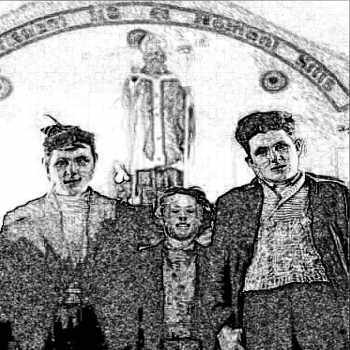 This, the most important sermon
of the week was given by the old man. The young
man gave gentle sermons about prayer and devotion
- the middle-aged man who was big, burly and gruff
gave more robust sermons about rowdiness,
drunkenness, honesty and easy things like that.
This, the most important sermon
of the week was given by the old man. The young
man gave gentle sermons about prayer and devotion
- the middle-aged man who was big, burly and gruff
gave more robust sermons about rowdiness,
drunkenness, honesty and easy things like that.
We knew absolutely nothing about company keeping but we were highly motivated and keen to learn. In fact we hoped to start practical trials as soon as possible and any tips or guidelines would be greatly appreciated. That's why we had looked forward to this night as we expected to gain valuable information while being told what 'not to do'. We assumed that the louder and more thunderous the exhortations, the more informative it might be. We did fear hell and the wrath of God but we expected to live long lives in which to repent and now our needs were pressing. 'The quiet road, the lonely road, is the broad road to destruction,' that's how he started off. It sounded promising. The only worse den of iniquity is the cinema. The only time we had been to the pictures was a matinee about 'The Song of Bernadette'. We saw no iniquity there. We had no idea what iniquity meant but from the sound of things it must have something to do with forbidden pleasure. Dens were resting places in long grass for certain wild animals, hares and the like. Maybe if you went company keeping in such a place that would be iniquity. Or it might lead to iniquity. We were anxious to hear more. We sure did hear more! 'In those dens of iniquity you have titillation on the screen and temptation in the stalls' he thundered. 'Wow' there was a word and a half. What did it mean? How did it work? It sounded exciting. Did you do it yourself or with someone else or to someone else, or did someone do it to you? Its possibilities were endless. Talk about entertaining bad thoughts! This was beyond our wildest dreams. We had a whole parlour full of bad thoughts here. We would need to live to a hundred years to get over all these thoughts. Our minds were so over-worked that we sailed into a sort of trance and totally lost track of the sermon or the holy man delivering it. That's what happened me anyway and I suppose it was the same for my pals Algie and Jimmy. They sat on my right, beside the centre aisle while on my left was an austere old gentleman who had hung his walking stick on the back of the seat in front of us. He was antagonistic from the start, when sash-wearing ushers made him move in to make room for us; he scowled but held his peace. We were barely on time and grinning as we shuffled in beside him, if looks could kill? Dreaming through my thoughts, I was dimly aware of the preacher telling of some old mystic who had a vision of a great sinner's conscience, right throughout his totally unrepentant life. He was disobedient as a child and showed no remorse he droned. Immediately in front of us was a dark haired young man who had just got a haircut, short back and sides. This was obvious as his neck was weather beaten except for a half inch white line bordering his hair. He had probably been on the bog all week. Just then I spotted a head-louse emerging from under his collar and heading for the new neat hairline. I elbowed Algie and pointed out the creeper with my eyes. 'A penny says he gets scratched off before he reaches the hairline,' I said out of the side of my mouth. Without reply he covered the penny I had placed on the seat between us. The old man threw a sidelong dirty look. We tried to look rapturously engrossed in the sermon. We did listen a bit and by now the unrepentant scoundrel was defiling young girls and still no remorse. The louse was now more than half way across the open space and my penny was sweating. At that time there were lice in every house, except ours! As the louse reached his target and Algie reached for the pennies, 'Doubles or quits he doesn't reach cover' said I as I put down another two pennies. There was a small chink, another dirty look and more angelic stares. This looked a good option for me as the louse was struggling in the new stubble and the cover was a good two inches away. By now the scoundrel in the sermon was stealing from his employer and going on drunken orgies and still, no remorse. Instead of scratching, the man with the louse began to nod off and his head tilted forward making the going easier for the insect and further endangering my bet. Having smashed all of the Ten Commandments with total defiance and no trace of remorse the scoundrel was now dead and lying in his coffin at his own wake. People were supping drinks and trying with great difficulty, to recall something good to say about him, when suddenly the corpse roared out, 'I am damned.' This brought everyone in the church to attention. Our nodding louse-man sat bolt upright, twitching his stubble neck and sending the louse soaring in the air. I had won my bet. My joy was short lived. The louse landed right in the fly of Algie's trousers. There were no zips in those days. He gave an almighty 'bunnogue' (an awkward panic-stricken sideways lurch) putting the pennies and the old mans stick clattering on to the floor. Anybody would think that it was a lion, not a louse that was threatening his prized possessions. I just could not contain the belly laugh. The problem was I had just gained control of my new big voice but the laugh was only half there. It started off falsetto, going very deep and back falsetto, altogether like a demonic sneer of unearthly origins. There was a great turning of heads and general rustle. Oh God help me I was in deep trouble. I urged Algie and Jimmy to make a run for it. By now the old man had recovered his stick and was poking me behind and hissing about sacrilegious young blackguards who needed the devil beaten out of them. The preacher continued, pretending not to notice the commotion but the young missioner was heading down in our direction and the middle-aged man, coming from the rear, cut off our retreat. I was facing the death penalty, or at least excommunication. I decided to blame the louse! Now I knew how Eve must have felt when blaming the snake. 'What is the meaning of this?' The big man demanded. 'It all started when he shouted, I am damned' I stuttered. He looked down at Algie, still clutching his valuables. 'My goodness' he said, 'Was he frightened into an accident?' 'Take him out,' he said, in a much more conciliatory tone. As we shuffled down the aisle, I thought, 'Oh thank you God, you really did come to save sinners.' Algie was petrified, Jimmy was mortified, and I was satisfied, having my sentence commuted to a fourpenny fine and a sore behind. And the louse! He just married locally and lived happily ever after. Pat Watson 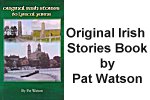
'The Mission' is one of sixty lyrical yarns from 'Original Irish Stories' by Pat Watson, Creagh, Bealnamulla, Athlone, Ireland. Visit: https://goo.gl/FDp48v or you can email the author here: pjwatson77@gmail.com |


find out more |

|
(and yet another reason why the Irish and English are so different) Tanistry was a Gaelic method whereby the successor to a Chieftainship could be selected from among several eligible contenders. It was not necessarily the direct descendant of the Chief who would succeed him, rather, the successor would be elected from among those who were 'righdamhna', meaning 'of kingly material'. 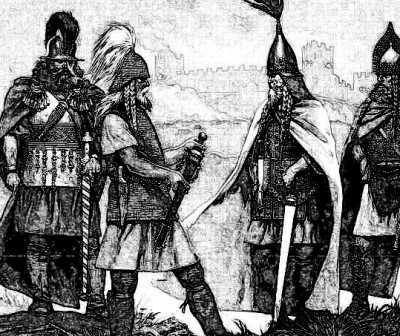
Where no outstanding candidate emerged then any male member of the sept could be so elected as Chief. All that was required was that the candidate was an ancestral member of the sept although in practice those with ancestral connections to the Chief often had more standing and thus were more likely to be elected as the new Chief. An example of Tanistry in practice is recalled in the succession to the Kingship of Ireland by Eochaid Gonnat in the third century. Eochaid Gonnat succeeded Cormac mac Airt as King despite the named Tanist of the time being Cairbre Lifechair, Cormac's eldest son. The 'Annals of Connacht' is an ancient manuscript that recalls the events in Ireland from the year 1224 to 1544. It states that at the Second Battle of Athenry in August 1316, King Tadc Ó Cellaig of Uí Maine was slain and in addition 'there fell with him... twenty-eight men who were entitled to succeed to the kingship of Uí Maine.' Tanistry differs from Primogeniture in several ways including that succession is less predictable. In Primogeniture the eldest male in the family line would automatically inherit. In Tanistry this was not necessarily the case. In theory any member of the sept could attain the Chieftainship and all that such responsibility confers. This would include the use of a family coat of arms. The difference between Gaelic Tanistry and English Primogeniture is one of the principle reasons why Irish heraldry is so different from English. In Ireland any member of the sept can reasonably bear the ancient family coat of arms, given that it is at least possible that they may have attained the position of Chief, or alternatively, that the authentic Chieftainship ceased when Tanistry stopped. In the English system of Primogeniture no such possibility existed. In the wake of the English victory at Kinsale and the 'Flight of the Earls' in the year 1607 the choice facing the Gaelic Chiefs was simple. Either adopt Primogeniture and surrender to the English crown, or face being exterminated. Unsurprisingly many surrendered and were 'regranted' some lands and titles. Many of those Irish families who retain claim to these titles up to the modern era do so on the basis of Primogeniture! Some regard this as completely invalid and in opposition to the ancient Gaelic system. Others (particularly those in possession of such titles), regard the seventeenth century adoption of Primogeniture as a practical necessary step and encourage its continuance. No less than the former Chief Herald of Ireland, Edward MacLysaght (1887-1986), perhaps the foremost Irish genealogist of the twentieth century, interpreted Irish history, genealogy and Tanistry as a basis for the concept of 'sept arms' or an 'Irish family coat of arms' being freely borne by any member of the sept. While some later genealogists disagreed with his logic their reasons for doing so are often self-serving. From the book 'More Irish Families' by Edward MacLysaght, the first Chief Herald of Ireland: 'Many Irish coats of arms may be displayed without impropriety by any person of the sept indicated if he really does belong to that sept.' While Tanistry could be regarded as being more democratic, community-based and fairer than Primogeniture, it also made succession less predictable and often caused disputes and even wars between rival factions within a sept or clan. This is one of the reasons that there has been a lack of central leadership in Ireland, a characteristic that would prove very limiting in terms of Irish resistance to English-imposed military rule. Not since Brian Boru defeated the Vikings at Clontarf in the year 1014 has Ireland possessed such an all-encompassing Irish leader. This is a stark fact that made the colonization of the country easier for the English invaders, who would have surely triumphed regardless, given their vastly superior numbers and military might. Primogeniture was much more predictable and stable, if also selfish, empowering dynasties with generations of centralized power and authority. Authority to rule, and to conquer. The two systems are starkly different and offer another vivid historical example of the difference between the Irish and English cultures. |

|
||||

 The New Cork Evening Post, 6 April 1807 WHIPPED FOR STEALING A GOAT 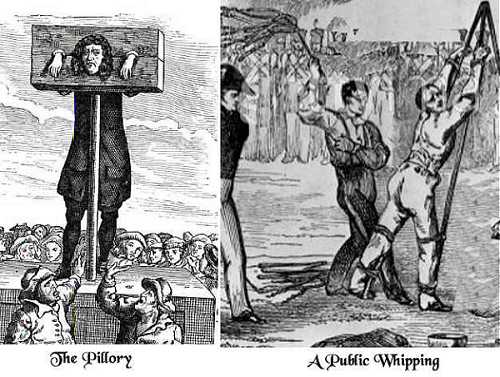
The Following Persons Were Convicted in the City Court: Margaret M'Dermot, for feloniously stealing a silver basket and other articles of plate, of the goods of John Bernard, burned in the hand. Catherine Ahern, for feloniously stealing a goat of the goods of Robert Hall, to be imprisoned a fortnight, and privately whipped, and then discharged. Mary Garvan, and Mary Sullivan, alias Mary Gentle for stealing 29 yards of calico, of the goods of Nicholas Fitzpatrick, to be imprisoned a month, twice privately whipped, and then discharged. Mathew Gentle, for receiving ten yards of cambric and other haberdashery ware, of the goods of Francis Hynes, lately before feloniously stolen by the said Mary Sullivan, otherwise called Mary Gentle, to be imprisoned one month and then pilloried. Catherine Mahony, for feloniously stealing 4 dozen of cotton handkerchiefs, 8 yards of Muslin, and 3 patterns of waistcoats the goods of Mr. Ryland, to be imprisoned a fortnight, and once privately whipped. Mary Shelly, for feloniously stealing four hats of the goods of Thomas Hardum, to be imprisoned a fortnight and once publicly whipped. Hugh Keane for feloniously stealing one quarter box of raisins and other grocery wares, of the goods of Elizabeth Long, to be burned in the hand and imprisoned a month. Mary Connor for feloniously stealing five yards of calico, of the goods of John Shee, to be imprisoned a fortnight and privately whipped. John Donoghue, for an assault on Matilda Hennessy, to be imprisoned six months. |

View the Archive of Irish Phrases here: http://www.ireland-information.com/irishphrases.htm |

|
The winner was: mpwalsh@hotmail.co.uk who will receive the following: A Single Family Crest Print (usually US$24.99) Send us an email to claim your print, and well done! Remember that all subscribers to this newsletter are automatically entered into the competition every time. I hope that you have enjoyed this issue! 
by Michael Green, Editor, The Information about Ireland Site. http://www.ireland-information.com Contact us (C) Copyright - The Information about Ireland Site, 2019. 17 Páirc Ghrainbhil, Carraig Dubh, Contae Baile átha Cliath, Ireland Tel: 353 1 2893860 |

|
MARVELOUS GIFTS FOR ANY OCCASION FREE DELIVERY TO YOUR DOOR 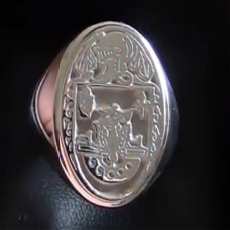
BIG REDUCTIONS! Stunning Family Crest Signet and Seal Rings 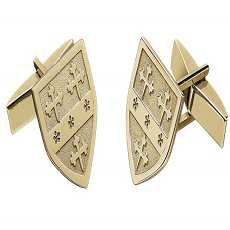
DISCOUNTED FOR A LIMITED TIME Elegant Cufflinks 
Incredible Family Crest Plaques Made in Ireland 
Superior Framed Family Crest Parchments 
Gorgeous Glistening Galway Crystal 'Your-Name' Old Irish Sign NEW DESIGNS! 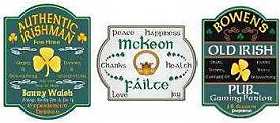
From US$34.99 - Free Delivery 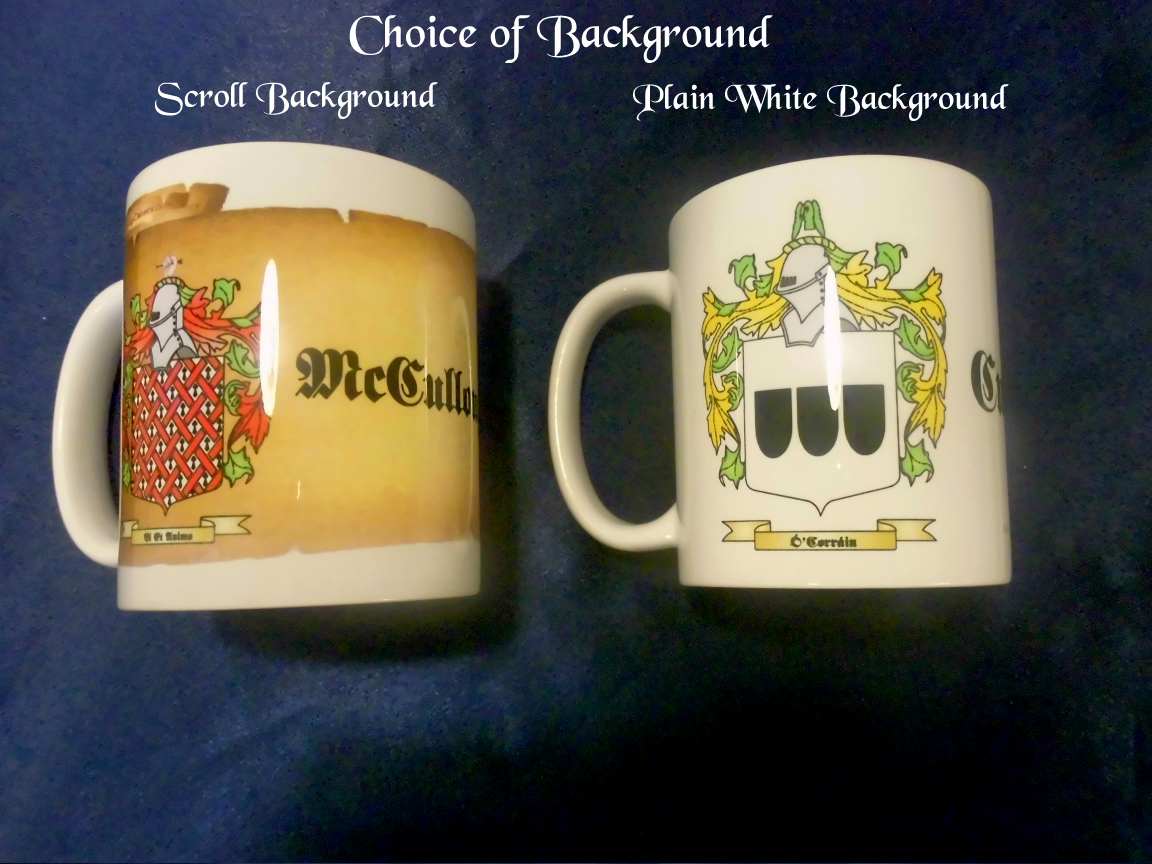
New Designs available on our Coffee Mugs 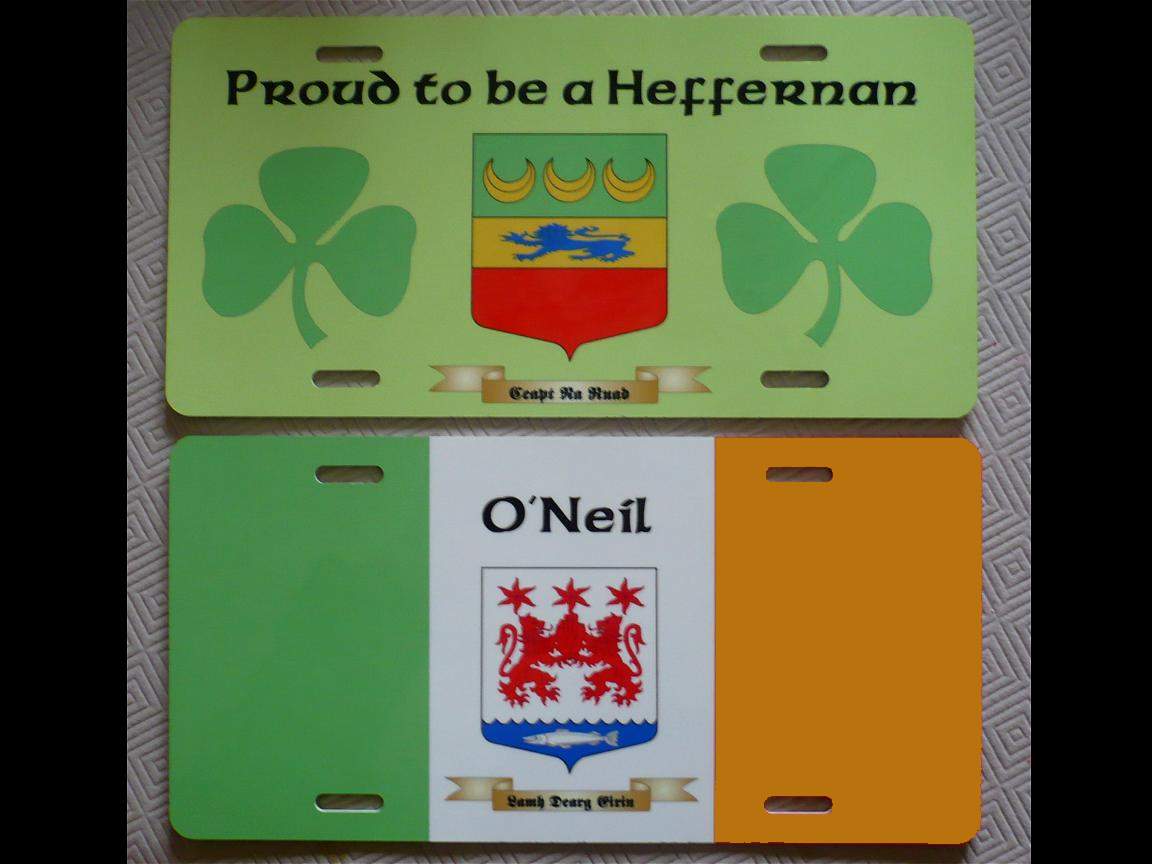
Personalized Licence Plate 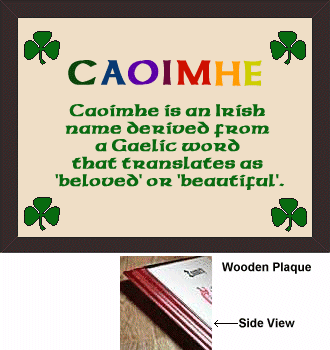
Personalized First Name Plaque. Great for Kids! 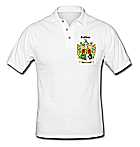
'Your-Name' Polo & Tee Shirts 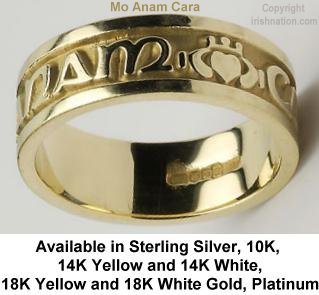
From US$69 Delivered BIG REDUCTIONS! Stunning Engraved Rings from Ireland with Irish Language Phrases. Mo Anam Cara: My Soul Mate Gra Dilseacht Cairdeas: Love, Loyalty, Friendship Gra Go Deo: Love Forever Gra Geal Mo Chroi: Bright Love of my Heart SEE MORE GREAT OFFERS AND DISCOUNTS AT: IRISHNATION.COM FREE DELIVERY FOR A LIMITED TIME! |
